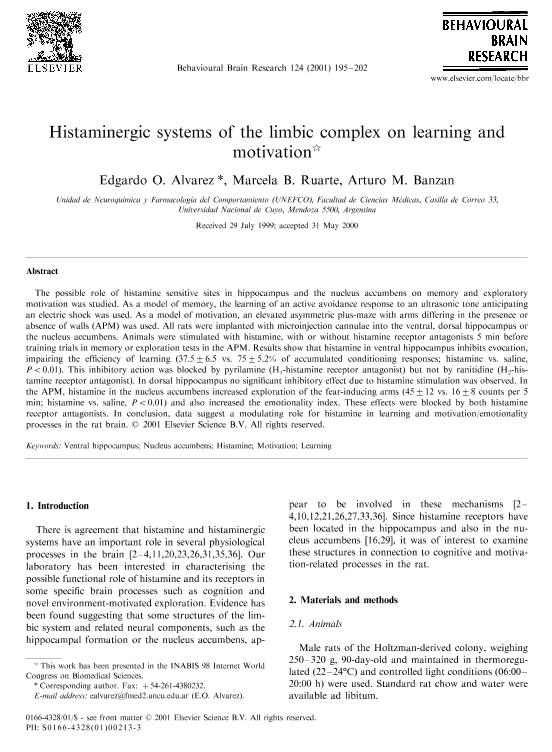Mostrar el registro sencillo del ítem
dc.contributor.author
Alvarez, Edgardo O.
dc.contributor.author
Ruarte, Marcela B.
dc.contributor.author
Banzan, Arturo Martin

dc.date.available
2021-03-04T20:52:35Z
dc.date.issued
2001-10
dc.identifier.citation
Alvarez, Edgardo O.; Ruarte, Marcela B.; Banzan, Arturo Martin; Histaminergic systems of the limbic complex on learning and motivation; Elsevier Science; Behavioural Brain Research; 124; 2; 10-2001; 195-202
dc.identifier.issn
0166-4328
dc.identifier.uri
http://hdl.handle.net/11336/127535
dc.description.abstract
The possible role of histamine sensitive sites in hippocampus and the nucleus accumbens on memory and exploratory motivation was studied. As a model of memory, the learning of an active avoidance response to an ultrasonic tone anticipating an electric shock was used. As a model of motivation, an elevated asymmetric plus-maze with arms differing in the presence or absence of walls (APM) was used. All rats were implanted with microinjection cannulae into the ventral, dorsal hippocampus or the nucleus accumbens. Animals were stimulated with histamine, with or without histamine receptor antagonists 5 min before training trials in memory or exploration tests in the APM. Results show that histamine in ventral hippocampus inhibits evocation, impairing the efficiency of learning (37.5 ± 6.5 vs. 75 ± 5.2% of accumulated conditioning responses; histamine vs. saline, P < 0.01). This inhibitory action was blocked by pyrilamine (H1-histamine receptor antagonist) but not by ranitidine (H2-histamine receptor antagonist). In dorsal hippocampus no significant inhibitory effect due to histamine stimulation was observed. In the APM, histamine in the nucleus accumbens increased exploration of the fear-inducing arms (45 ± 12 vs. 16 ± 8 counts per 5 min; histamine vs. saline, P < 0.01) and also increased the emotionality index. These effects were blocked by both histamine receptor antagonists. In conclusion, data suggest a modulating role for histamine in learning and motivation/emotionality processes in the rat brain.
dc.format
application/pdf
dc.language.iso
eng
dc.publisher
Elsevier Science

dc.rights
info:eu-repo/semantics/openAccess
dc.rights.uri
https://creativecommons.org/licenses/by-nc-sa/2.5/ar/
dc.subject
HISTAMINE
dc.subject
LEARNING
dc.subject
MOTIVATION
dc.subject
NUCLEUS ACCUMBENS
dc.subject
VENTRAL HIPPOCAMPUS
dc.subject.classification
Fisiología

dc.subject.classification
Medicina Básica

dc.subject.classification
CIENCIAS MÉDICAS Y DE LA SALUD

dc.title
Histaminergic systems of the limbic complex on learning and motivation
dc.type
info:eu-repo/semantics/article
dc.type
info:ar-repo/semantics/artículo
dc.type
info:eu-repo/semantics/publishedVersion
dc.date.updated
2021-01-18T15:48:28Z
dc.journal.volume
124
dc.journal.number
2
dc.journal.pagination
195-202
dc.journal.pais
Países Bajos

dc.journal.ciudad
Amsterdam
dc.description.fil
Fil: Alvarez, Edgardo O.. Universidad Nacional de Cuyo. Facultad de Ciencias Médicas; Argentina
dc.description.fil
Fil: Ruarte, Marcela B.. Universidad Nacional de Cuyo. Facultad de Ciencias Médicas; Argentina
dc.description.fil
Fil: Banzan, Arturo Martin. Consejo Nacional de Investigaciones Científicas y Técnicas. Centro Científico Tecnológico Conicet - Mendoza. Instituto de Medicina y Biología Experimental de Cuyo; Argentina
dc.journal.title
Behavioural Brain Research

dc.relation.alternativeid
info:eu-repo/semantics/altIdentifier/doi/https://doi.org/10.1016/S0166-4328(01)00213-3
dc.relation.alternativeid
info:eu-repo/semantics/altIdentifier/url/https://www.sciencedirect.com/science/article/abs/pii/S0166432801002133
Archivos asociados
